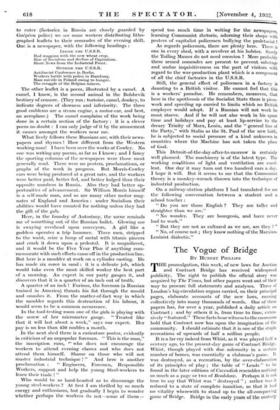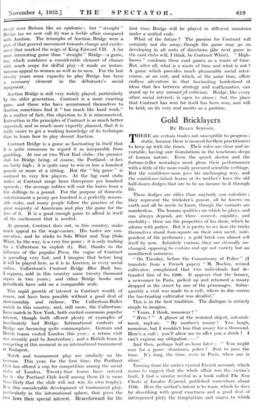The Vogue of Bridge
By HUBERT PHILLIPS THE promulgation, this week, of new laws for Auction and Contract Bridge has received widespread publicity. The right to publish the official story was acquired by The Times, but other papers went out of their way to procure full statements and analyses. Three of London's big-circulation organs carried, on their principal pages, elaborate accounts of the new laws, running collectively into many thousands of words. One of these papers has, for over a year, published a daily article on Contract ; and by others it is, from time to time, extea- sively "featured." These facts bear witness to the enormous hold that Contract now has upon the imagination of the community. I should estimate that it is one of the staple recreations of upwards of half a million people.
It is a far cry indeed from Whist, as it was played half a century ago, to the present-day game of Contract Bridge. Whist, though played with due solemnity in a certain number of homes, was essentially a clubman's game. It was destroyed, as a recreation, by the over-elaboration of its principles of play ; the table of " Leads " to be found in the later editions of Cavendish resembles nothing so much as a page or two of Bradshaw. Perhaps it is not true to say that Whist was " destroyed " ; rather was it reduced to a state of complete inanition, so that it had no vitality wherewith to stand up to the all-conquering game of Bridge. Bridge in the early years of the century swept over Britain like an epidemic ; but " straight " Bridge (as we now call it) was a feeble affair compared with Auction. The triumphs of Auction Bridge were a part of that general movement towards change and excite- ment that marked the reign of King Edward VII. A far more interesting game than " straight " Bridge—a game, too, which combines a considerable element of chance with much scope for skilful play—it made an instan- taneous appeal to women as well as to men. For the last twenty years some capacity to play Bridge has been a necessary element in the debutante's social equipment.
Auction Bridge is still very widely played, particularly by the older generation. Contract is a more exacting game, and those who -have accustomed themselves to Auction sometimes find it "too much like hard work." As a matter of fact, this objection to it is misconceived. Instruction in the principles of Contract is so much better organized, and so much more expertly planned, that it is really easier to get a working knowledge of its technique than to learn how to play decent Auction.
Contract Bridge is a game so fascinating in itself that it is quite erroneous to regard it as inseparable from gambling. At one or two West End clubs—the premier club for Bridge being, of course, the Portland—stikes are fairly high ; it is quite easy to win or lose a hundred pounds or more at a sitting. But the "big game" is confined to very few players. At the big card clubs stakes at Contract range from threepence per hundred upwards ; the average rubber will cost the losers from a few shillings to a pound. For the purpose of domestic entertainment a penny per hundred is a perfectly reason- able stake, and many people follow the practice of the great majority of Americans and play the game for the love of it. It is a good enough game to afford in itself all the excitement that is needed.
At present, Contract does not, in this country, make much appeal to the wage-earner. His tastes are con- servative, and he sticks to Solo Whist and Nap (Solo 'Whist, by the way, is a very fine game ; it is only waiting for a Culbertson to exploit it). But, thanks to the influence of the popular Press, the vogue of Contract is spreading very fast, and I imagine that before long it will be played here, as it is in America, in every social milieu. Culbertson's Contract Bridge Blue Book has, I suppose, sold in this country some twenty thousand copies in two 'years ; and . other Bridge books and periodicals have sold on a comparable scale.
This rapid growth of interest in Contract would, of course, not have been possible without a good deal of showmanship and reclame. The Culbertson-Buller match in this country, and, still more, the Culbertson- Lenz match in New York, both excited enormous popular interest, though both offered plenty of examples of inordinately bad Bridge. International contests of Bridge are becoming quite commonplace. German and Dutch teams visited London this year ; a return visit Was recently paid to Amsterdam ; and a British team is competing at this moment in an international tournament at Budapest.
Match and tournament play are similarly on the increase. This year, for the first time, the Portland Club has offered a cup for competition among the social clubs of London. Twenty-four teams have entered for it—the Portland Club itself among them (it is more than likely that the club will not win its own trophy). It is this considerable development of tournament play, Particularly in the international sphere, that gives the new laws their special interest. Henceforward for the first time Bridge will be played in different countries under a unified code.
What of the future ? The passion for Contract will certainly not die away, though the game may go on developing in all sorts of directions (the next game in the card clubs will, I think, be Contract Whist). " High- brows " condemn these card games as a waste of time. But, after all, what is a waste of time and what is not ? A game which provides much pleasurable social inter- course, at no cost, and which, at the same time, offers endless adventure in that fascinating borderland ol ideas that lies between, strategy and mathematics, can stand up to any amount:of criticism. Bridge, like every other social interest, is open to abuse ; but the place that Contract has won for itself has been won, and will be held, on its very real merits as a pastime.











































 Previous page
Previous page